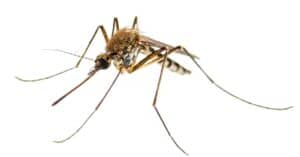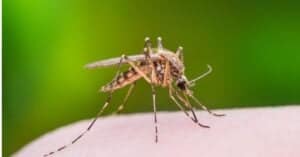Just about everyone looks forward to warm summer days! The beautiful weather makes it easy to spend time outdoors, make memories with loved ones, and soak up as much sunshine as possible!
One of the only downfalls of this beautiful time of year is the pesky insects. None are quite as bothersome as mosquitoes. Although you can expect to spot these flying blood-suckers in the great outdoors, what happens when they make it inside your home?
The last thing you want is to be comfortable in your bed and suddenly hear that familiar buzz of a mosquito. Thankfully, we’ve created a convenient and easy-to-follow step-by-step guide to help you rid your home of these critters once and for all!
Dangers Mosquitoes Bring
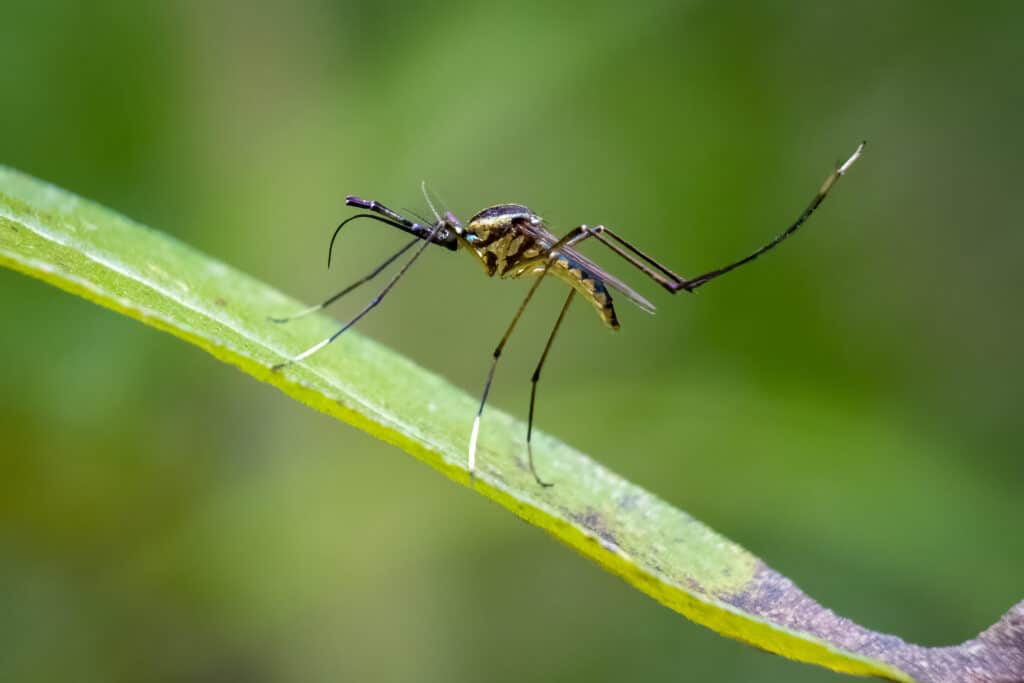
There are more than 3,000 species of mosquitoes worldwide.
©samray/Shutterstock.com
Almost 200 different mosquito species can be found in the United States alone. There are more than 3,000 different species worldwide. Regrettably, these winged pests can spread a variety of viruses, including Zika, West Nile, dengue, yellow fever, and more.
This threat to people is brought on by mosquitoes ingesting the illness. They then carry it around in their bloodstream, spreading it to the next victim they bite. It’s a widespread myth that mosquitoes feed on blood. Mosquitoes use blood to refuel their bodies so they can produce and successfully develop healthy eggs.
Mosquito populations can easily become out of control. That’s because they can lay 100 eggs at a time, according to the Centers for Disease Control and Prevention (CDC). In order to get rid of mosquitoes effectively, it’s important to employ a variety of techniques.
It’s crucial to understand that killing mosquitoes and repelling them are two different things. Making yourself less appealing to mosquitoes will repel them from you. They are drawn to the components of our sweat and the carbon dioxide in our breath. In addition to being drawn to standing water, mosquitoes lay their eggs in puddles, moist potting soil, birdbaths, stagnant water in kitchens, and other places.
Although killing mosquitoes might seem like a good idea, it’s not necessarily best for ourselves or the environment. Mosquitoes can develop a resistance to insecticides over time, making it harder for you to get rid of them. If you have a little infestation, try natural remedies first. If you have a significant infestation, call in the experts.
Signs of Mosquito Infestation
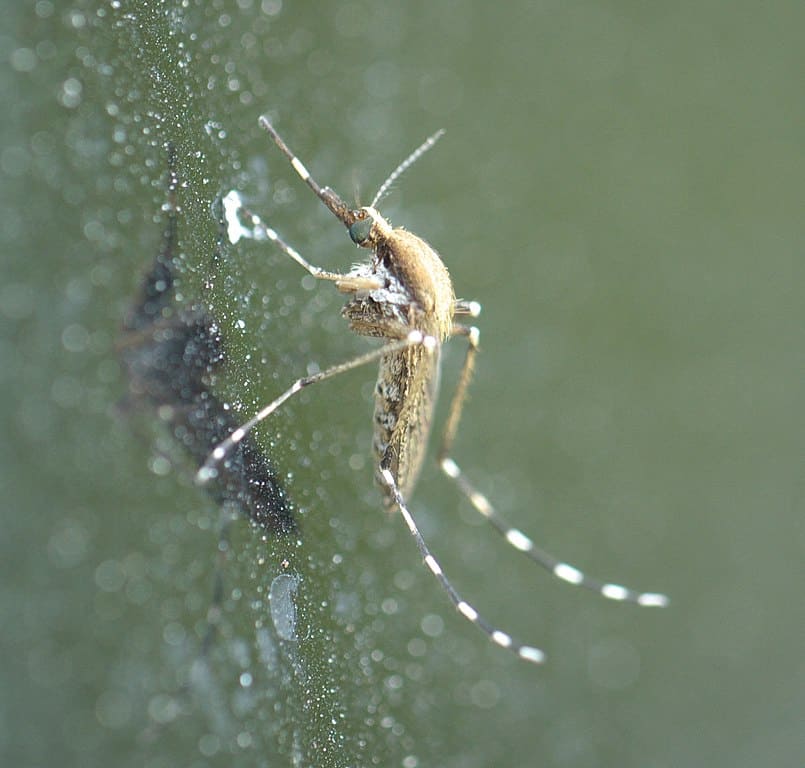
Mosquitoes are mostly active at night, but if they infest an area, they may operate a bit earlier than that.
©xpda / CC BY-SA 4.0 – License
Some parts of the United States, particularly those that are prone to hot, muggy, and rainy weather, may be accustomed to a certain number of mosquitoes. An infestation, though, may become apparent if you start noticing a lot more mosquitoes than usual. Since mosquitoes are most active at night, seeing them in the late afternoon or early evening could indicate a problem.
Another indication of a mosquito infestation is if you get many itching bug bites. That’s especially true if they happen at night, or if you realize that you are continually being bitten. Some people won’t feel the bite of a mosquito right away, but they may have irritation, edema, and inflammation.
The Best Way to Get Rid of Mosquitoes Indoors
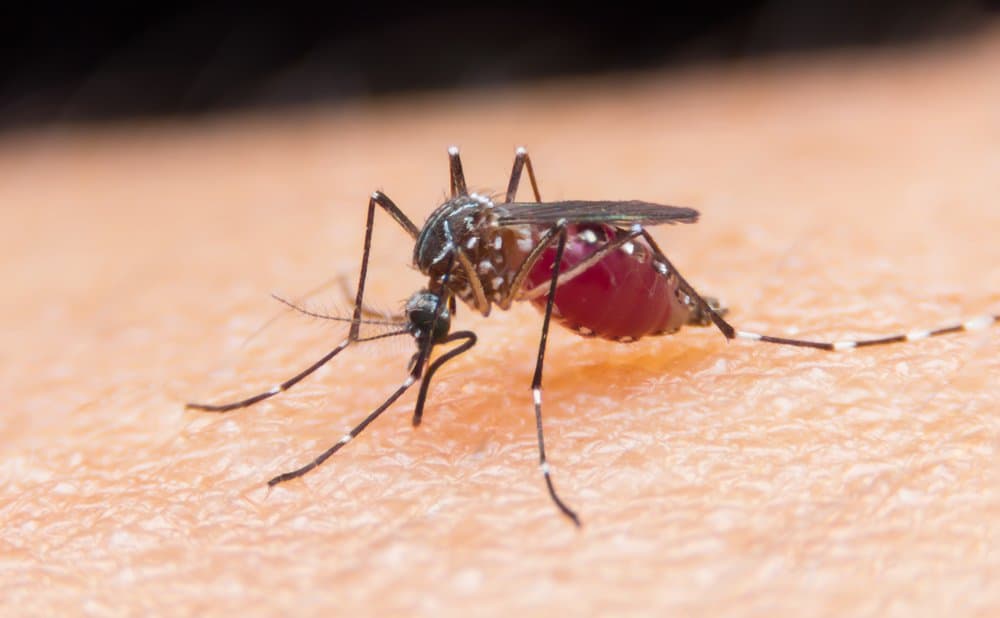
If mosquitoes have invaded your home, several methods can help eliminate them.
©AUUSanAKUL/Shutterstock.com
Having mosquito problems in your yard is more common than in your actual home. Having them buzzing around at night can be annoying, though.
During the day, it is easier to see mosquitoes swarming around than it is at night. In the event that it is dark and you need to find them, switch on a lamp, flashlight, or smartphone. Then, watch for their attraction to the light.
The best techniques for keeping mosquitoes out of your home are listed here.
Eliminate Standing Water
Eliminating or keeping any standing water in your home on a regular basis is probably one of the most significant and efficient techniques to get rid of mosquitoes and prevent their recurrence. Any object that can store water, such as a shower, kitchen sink, or drinking glass, may serve as a mosquito breeding habitat.
Ensure sure water storage containers, such as cisterns and rain barrels, are completely shut. That helps prevent mosquitoes from laying their eggs there.
You should periodically empty and clean any containers you do keep outside, such as birdbaths and swimming pools. With a “mosquito dunk,” water elements like fountains and ponds can be treated. This erodible disk contains a microorganism that is poisonous to mosquito larvae.
Chemical Repellants
The most effective strategy to prevent bites for you and your family is to apply a chemical mosquito repellent. It is advised that adults use products with a DEET concentration of 30–50%. Children over the age of 2 should use products with a DEET concentration of no more than 10–30%.
These chemical repellents have been shown to be the most successful at preventing mosquito bites. As sunscreen blocks the effects of chemicals, it is important to apply mosquito repellent over it rather than the other way around.
Mosquito Netting
It is advised to use mosquito netting to shield infants younger than two months from mosquito bites if you reside in a high-mosquito area and have small children. Chemical repellents are thought to be harmful to newborns’ health and therefore to be avoided at all costs.
If you want to sleep with the windows or doors opened at night, giving mosquitoes access, mosquito netting is also helpful for removing mosquitoes from the home.
Camphor Oil

Camphor oil is a natural repellent of mosquitoes.
©Monrudee/Shutterstock.com
It has been discovered that camphor works as a repellent for a very long time. All you have to do is ignite some camphor and leave it burning for 15 to 20 minutes in a room that has all the doors and windows shut. Camphor is a natural oil that, like the others on our list, has several uses in addition to keeping mosquitoes away.
In just a bit of time, your room will be clear of mosquitoes, but it will also likely smell bad to you. Another option is to just leave camphor tablets in a place where they will quickly evaporate. Camphor provides a wide range of other advantages, including drowsiness, easier breathing, and use as a herbal remedy for muscle discomfort.
Ultrasonic Repellant
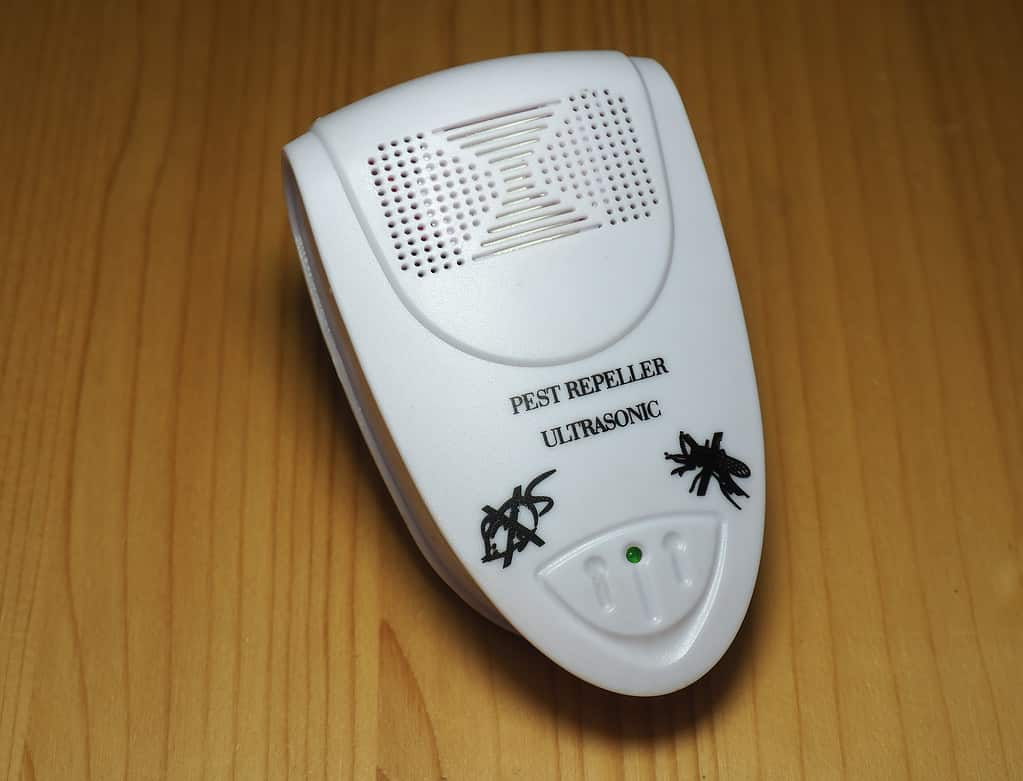
Ultrasonic pest repellers are useful for keeping away several types of pests, including mosquitoes.
©GS23/Shutterstock.com
In spite of the fact that ultrasonic repellers have been around for some time in some form, producers are currently working to make them more compact, appealing, and economical. The ultrasonic gadgets are believed to emit a radio frequency that will be extremely uncomfortable for pests including mosquitoes, bugs, and mice, though this is impossible to confirm.
You shouldn’t be impacted by the frequency because neither humans nor the majority of pets can hear it. Anecdotal evidence indicates that these repellents are effective in many situations, and given that they may also deter mice and ticks, they might be worth a shot. The best part is that only radio waves are released instead of chemicals.
Mosquito Traps
Mosquito traps are available offline, online, and even at home. You can get them from the grocery store. If you don’t have the budget to buy them, you can DIY them relatively easily. By slicing a plastic bottle in half, you may create a handmade mosquito trap for yourself. After that, thoroughly combine brown sugar with boiling water.
Pour the cooled fluid into the bottom of the bottle and stir in the yeast. Next, invert the bottle so that the funnel half is on the bottom half, with the bottle cap off. Place the bottle in the mosquito-prone region and secure it with black tape. Periodically, the solution must be changed in accordance with the instructions.
Mosquito Repellant Plants

Several plants repel mosquitoes, including catnip.
©Attila Fedyk/Shutterstock.com
You could simply grow plants that repel mosquitoes, like catnip and feverfew, in your flowerbed or on your windowsill to keep them out of your house. Even better, you can put them in your garden.
Regarding indoors, you might be able to get a home version of the plant or purchase the oil from a prepared plant to place in various locations. Just be careful because it might affect your pets.
Tulsi

Effective at repelling mosquitoes and killing mosquito larvae, tulsi is a useful tool in your fight against mosquitoes.
©iStock.com/Abul Hossain Asif
Tulsi has been observed to be effective in repelling mosquitoes and killing mosquito larvae. It is actually a pretty amazing and frequently-used plant, as seen by the fact that it is becoming more and more well-researched.
Easily grow a tulsi shrub close to your window since it has characteristics that keep mosquitoes out of your home. Tulsi, an Indian herb sometimes known as “holy basil,” is a common ingredient in many Indian recipes. When administered immediately to the biting region, it is also reported to be helpful in treating mosquito bites.
The photo featured at the top of this post is © mycteria/Shutterstock.com
Thank you for reading! Have some feedback for us? Contact the AZ Animals editorial team.



